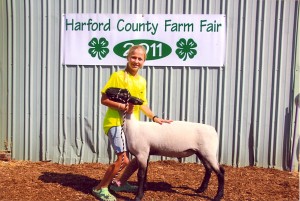This year we again bought a lamb at the Harford County Fair 4-H auction. Our freezer has been lambless for some months but the decision to bid was very last-minute. A call about a week after the event let us know the amount owed, that our lamb had been delivered to Bowman’s and that we should contact them about pick-up. We cleaned and rearranged the freezer, grabbed the split-oak basket and a few extra handle-bags, and, a day or so later, headed over.
Buying a lamb—dealing with small-farm-grown creatures of any kind—engenders a certain conflict in me and I pondered those feelings in an essay I had planned to post on this blog. When it was done, however, I wondered if the Baltimore Sun might not consider it, so I shipped it off to them. Happily it was accepted for publication and appeared on Sunday, August 14. Two days later, a letter from one Anna Martin of Baltimore, decrying both my dietary habits and the “violence” of my cuisine, appeared.
Her letter was followed online by vigorous conversation.
I expected the vegetarian/vegan exposition of ethics. I expected pro-animal-protein arguments and even the discussion of hunting. What I did not expect was the anger and vitriol that appeared to be rooted in class attitudes.
I acknowledged in the essay that the lamb, between purchase and preparation costs, was expensive; Ms. Martin correctly pointed out that the price was out of reach of many people, especially in these economic times. She seemed, however, to also think that I was suggesting that such costs were reasonable for everyone. I felt briefly like some modern-day Marie Antoinette.
A person writing under the name Poeticjustice applauded Ms. Martin’s letter, saying: “Cutler’s snooty essay is neither for the poor nor for the middle class. We spend millions on health care, on growing waist lines, arthritis, cancers and loads of other conditions induced or worsened by red meat. To romanticize this mindless foray in the 4H jungle as environmentally sound and then to link it to the organic feel of garden grown vegetables is a stretch of Cutler’s lamb fattened imagination.” (I also participate in a Community Supported Agriculture program and enjoy the largesse of Brad’s Produce. I do indeed like the idea of eating seasonally and buying locally.)
“Snooty.” Hmmm. Am I snooty? In all honesty, I suppose in some ways I am.
The suggestion that I must be a person of significant wealth and therefore a person who disdains the poor and has no sympathy for working people, however, speaks more to a sense of class warfare than it does dietary ideologies.
This past week New York Times food writer Mark Bittman (“The Minimalist”) addressed the economics of sustainable farming. He discussed vegetables grown by the estimable Eliot Coleman on his farm in Maine and touched on a number of issues. Bittman summarized the problem of costs—costs to the farmer and costs to the consumer—in the context of sustainable practices in his penultimate paragraph. His point is that the cost of food in grocery stores is not indicative of the costs of farming: “…though sustainably produced food is too expensive for some, conventional food doesn’t reflect either the subsidies required to grow it or the huge environmental or health care costs it incurs. Once it does, sustainable food would appear far more competitive.”
Food snobbery subsequently hit the media when chefs Anthony Bourdain and Paula Deen clashed. Frank Bruni in The New York Times found in this clash of culinary titans something more than overheated kitchen egos. He concurs with Bourdain that Deen’s cooking style is heavy on fats and sugars. The only recipe of hers I make myself is her “Ooey-Gooey Toffee Cake” which is, in fact, hugely popular with my crowd. He also points out Bourdain’s hypocrisy slamming Deen for “telling an already obese nation that it’s O.K. to eat food that is killing us” while serving artery-clogging paté and duck confit at his own restaurants. Bruni points out that the conflict is not about food as much as money, that the back-and-forth between Bourdain and Deen “exposes class tensions in the food world that sadly mirror those in society at large.” Bruni, himself an eminent journalist of food culture, recognizes his position of privilege and points out that privileges determine not just what and how one chooses to eat but whether one gets food at all.
So it has been a flavorful week.
Just after the Sunr an my essay and all this brouhaha got underway, I received a letter from the young farmer whose sheep now resides in my freezer. She thanked me for buying her sheep and for supporting 4-H and the Livestock Club. As I opened the envelope, a photograph dropped out. “Oh no,” I wailed to my Dear One. “It’s a picture of my 4-H’er and her sheep!”
After all, as I pointed out in my essay, “I don’t choose the lamb myself. I don’t have any desire to get to know my dinner prior to its incarnation as chops, roast or ragout, not even from the distance of the grandstands.” The fact is I am squeamish. I don’t want to think about the space between the moment captured in this photograph and my arrival at Bowman’s. I am firmly ensconced on that famous “barge on de Nile.” If I am going to talk the talk of sustainable agriculture and responsible consumerism, however, I had better disembark from so unstable a boat and find the firm ground of reality.
Well done, young farmer. Thank you for giving me this chance to see something of the truth.

